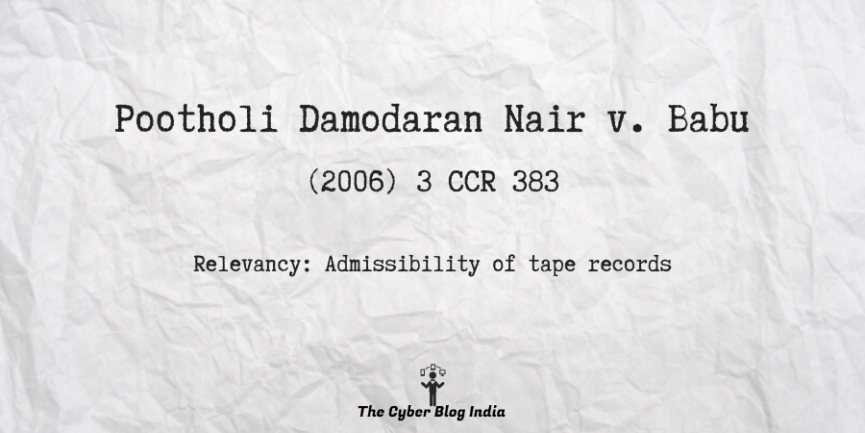Pootholi Damodaran Nair v. Babu

Pootholi Damodaran Nair v. Babu
(2006) 3 CCR 383
In the High Court of Kerala
WP(C) No. 35871/2003
Before Justice K. R. Udayabhanu
Decided on March 30, 2005
Relevancy of the case: Admissibility of a tape record in the Court.
Statutes & Provisions Involved
- The Information Technology Act, 2000 (Section 2(1)(t), 2(1)(o))
- The Indian Evidence Act, 1872 (Section 63, 65A, 65B)
Relevant Facts of the Case
- The writ petitioner, who is the defendant in a previous suit sought to quash the order of the Munsiff declining his request to have the magnetic tape that he produced, played in the open court.
- The cassette contained the recorded contents of his conversations with the plaintiff on the alleged date of the transaction involving the handing over of the disputed cheque.
- In the previous suit, the defendant contested a loan transaction on grounds that the cheque transmitted was because of deception and subterfuge that the plaintiff perpetrated to secure a job as a conductor in the K.S.R.T.C. for the defendant’s son.
- The plaintiff told the defendant that he has close contacts at the Cabinet level and that only on payment of ₹ 1,75,000, He would materialise the assignment. The defendant paid ₹ 1,25,000 in cash for the balance and issued a cheque for ₹ 50,000.
- Subsequently, the defendant realised that his son was selected purely on merit and not on the plaintiff’s intervention. Thereafter, he instructed his bank to stop payment on the particular cheque.
- The defendant’s son had tape-recorded the conversations and discussions made between the plaintiff and the defendant on the relevant day.
- During the proceedings of the suit, the defendant filed an interim application for playing the tape in Court for the purposes of identifying the voice of the person whose voice it is professed to be. Consequently, the need to establish the authenticity and correctness of the recording arose.
Prominent Arguments by the Advocates
- The petitioner’s counsel argued that the tape is vital evidence on his side as it contains a blow-by-blow account of what transpired on the occasion.
Opinion of the Bench
- The bench opined that the Court can allow the recording of the voice of a witness for the purpose of comparison with and identification of his earlier recorded voice. No Statute expressly or impliedly prohibits such comparison.
- Furthermore, the bench observed that the Court must very cautiously and carefully consider anything which is born of trickery trapping or cunningness. Since ventriloquism is not very uncommon, the Court should fully guard against all these possible tampering and manufacturing. It should look for independent corroboration and intrinsic evidence before it relies on the tape.
- The bench concluded that evidence in the form of tape records is advantageous to gauge the truth. However, there is a lot of space for manoeuvring. Hence the record must be verified properly to ensure authenticity.
Final Decision
- The bench thus, allowed the writ petition directing the administering of the records in the court as proof.
इस केस के सारांश को हिंदी में पढ़ने के लिए यहाँ क्लिक करें | To read this case summary in Hindi, click here.
